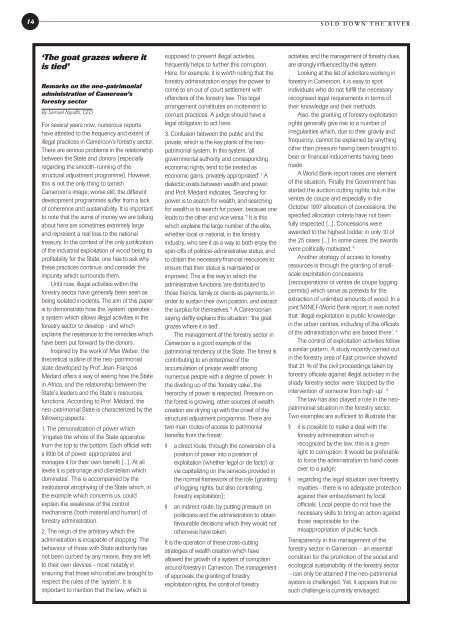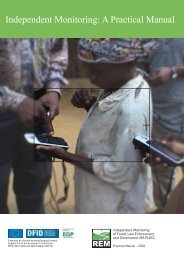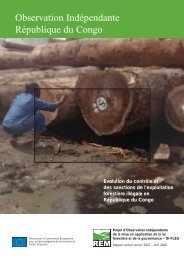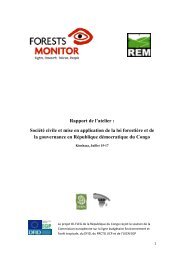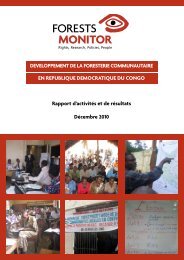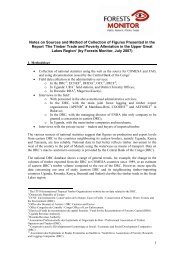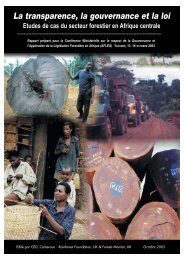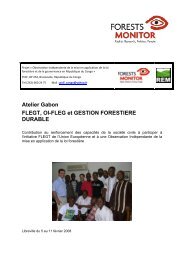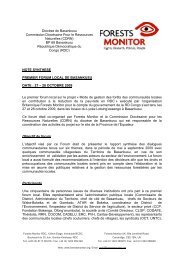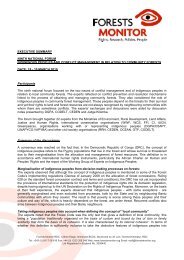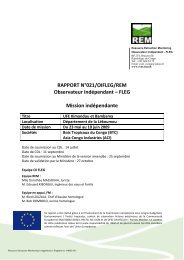Sold down the river - Salva le Foreste
Sold down the river - Salva le Foreste
Sold down the river - Salva le Foreste
Create successful ePaper yourself
Turn your PDF publications into a flip-book with our unique Google optimized e-Paper software.
14SOLD DOWN THE RIVER‘The goat grazes where itis tied’Remarks on <strong>the</strong> neo-patrimonialadministration of Cameroon’sforestry sectorBy Samuel Nguiffo, CEDFor several years now, numerous reportshave attested to <strong>the</strong> frequency and extent ofil<strong>le</strong>gal practices in Cameroon’s forestry sector.There are serious prob<strong>le</strong>ms in <strong>the</strong> relationshipbetween <strong>the</strong> State and donors (especiallyregarding <strong>the</strong> smooth-running of <strong>the</strong>structural adjustment programme). However,this is not <strong>the</strong> only thing to tarnishCameroon’s image; worse still, <strong>the</strong> differentdevelopment programmes suffer from a lackof coherence and sustainability. It is importantto note that <strong>the</strong> sums of money we are talkingabout here are sometimes extremely largeand represent a real loss to <strong>the</strong> nationaltreasury. In <strong>the</strong> context of <strong>the</strong> only justificationof <strong>the</strong> industrial exploitation of wood being itsprofitability for <strong>the</strong> State, one has to ask why<strong>the</strong>se practices continue, and consider <strong>the</strong>impunity which surrounds <strong>the</strong>m.Until now, il<strong>le</strong>gal activities within <strong>the</strong>forestry sector have generally been seen asbeing isolated incidents, The aim of this paperis to demonstrate how <strong>the</strong> ‘system’ operates -a system which allows il<strong>le</strong>gal activities in <strong>the</strong>forestry sector to develop - and whichexplains <strong>the</strong> resistance to <strong>the</strong> remedies whichhave been put forward by <strong>the</strong> donors.Inspired by <strong>the</strong> work of Max Weber, <strong>the</strong><strong>the</strong>oretical outline of <strong>the</strong> neo-patrimonialstate developed by Prof. Jean-FrançoisMédard offers a way of seeing how <strong>the</strong> Statein Africa, and <strong>the</strong> relationship between <strong>the</strong>State’s <strong>le</strong>aders and <strong>the</strong> State’s resources,functions. According to Prof. Médard, <strong>the</strong>neo-patrimonial State is characterized by <strong>the</strong>following aspects:1. The personalization of power which‘irrigates <strong>the</strong> who<strong>le</strong> of <strong>the</strong> State apparatusfrom <strong>the</strong> top to <strong>the</strong> bottom. Each official witha litt<strong>le</strong> bit of power appropriates andmanages it for <strong>the</strong>ir own benefit [...]. At all<strong>le</strong>vels it is patronage and clientelism whichdominates’. This is accompanied by <strong>the</strong>institutional atrophying of <strong>the</strong> State which, in<strong>the</strong> examp<strong>le</strong> which concerns us, couldexplain <strong>the</strong> weakness of <strong>the</strong> controlmechanisms (both material and human) offorestry administration.2. The reign of <strong>the</strong> arbitrary which <strong>the</strong>administration is incapab<strong>le</strong> of stopping. Thebehaviour of those with State authority hasnot been curbed by any means, <strong>the</strong>y are <strong>le</strong>ftto <strong>the</strong>ir own devices - most notably inensuring that those who rebel are brought torespect <strong>the</strong> ru<strong>le</strong>s of <strong>the</strong> ‘system’. It isimportant to mention that <strong>the</strong> law, which issupposed to prevent il<strong>le</strong>gal activities,frequently helps to fur<strong>the</strong>r this corruption.Here, for examp<strong>le</strong>, it is worth noting that <strong>the</strong>forestry administration enjoys <strong>the</strong> power tocome to an out of court sett<strong>le</strong>ment withoffenders of <strong>the</strong> forestry law. This <strong>le</strong>galarrangement constitutes an incitement tocorrupt practices. A judge should have a<strong>le</strong>gal obligation to act here.3. Confusion between <strong>the</strong> public and <strong>the</strong>private, which is <strong>the</strong> key plank of <strong>the</strong> neopatrimonialsystem. In this system, ‘allgovernmental authority and correspondingeconomic rights, tend to be treated aseconomic gains, privately appropriated’. 1 Adia<strong>le</strong>ctic exists between wealth and power,and Prof. Médard indicates, ‘Searching forpower is to search for wealth, and searchingfor wealth is to search for power, because one<strong>le</strong>ads to <strong>the</strong> o<strong>the</strong>r and vice versa.’ 2 It is thiswhich explains <strong>the</strong> large number of <strong>the</strong> elite,whe<strong>the</strong>r local or national, in <strong>the</strong> forestryindustry, who see it as a way to both enjoy <strong>the</strong>spin-offs of political-administrative status, andto obtain <strong>the</strong> necessary financial resources toensure that <strong>the</strong>ir status is maintained orimproved. This is <strong>the</strong> way in which <strong>the</strong>administrative functions ‘are distributed tothose friends, family or clients as payments, inorder to sustain <strong>the</strong>ir own position, and extract<strong>the</strong> surplus for <strong>the</strong>mselves.’ 3 A Camerooniansaying deftly explains this situation: ‘<strong>the</strong> goatgrazes where it is tied’.The management of <strong>the</strong> forestry sector inCameroon is a good examp<strong>le</strong> of <strong>the</strong>patrimonial tendency of <strong>the</strong> State. The forest iscontributing to an enterprise of <strong>the</strong>accumulation of private wealth amongnumerous peop<strong>le</strong> with a degree of power. In<strong>the</strong> dividing up of <strong>the</strong> ‘forestry cake’, <strong>the</strong>hierarchy of power is respected. Pressure on<strong>the</strong> forest is growing, o<strong>the</strong>r sources of wealthcreation are drying up with <strong>the</strong> onset of <strong>the</strong>structural adjustment programme. There aretwo main routes of access to patrimonialbenefits from <strong>the</strong> forest:§ a direct route, through <strong>the</strong> conversion of aposition of power into a position ofexploitation (whe<strong>the</strong>r <strong>le</strong>gal or de facto) orvia capitalizing on <strong>the</strong> services provided in<strong>the</strong> normal framework of <strong>the</strong> ro<strong>le</strong> (grantingof logging rights, but also controllingforestry exploitation);§ an indirect route, by putting pressure onpoliticians and <strong>the</strong> administration to obtainfavourab<strong>le</strong> decisions which <strong>the</strong>y would noto<strong>the</strong>rwise have taken.It is <strong>the</strong> operation of <strong>the</strong>se cross-cuttingstrategies of wealth creation which haveallowed <strong>the</strong> growth of a system of corruptionaround forestry in Cameroon. The managementof approvals, <strong>the</strong> granting of forestryexploitation rights, <strong>the</strong> control of forestryactivities, and <strong>the</strong> management of forestry dues,are strongly influenced by this system.Looking at <strong>the</strong> list of solicitors working inforestry in Cameroon, it is easy to spotindividuals who do not fulfill <strong>the</strong> necessaryrecognised <strong>le</strong>gal requirements in terms of<strong>the</strong>ir know<strong>le</strong>dge and <strong>the</strong>ir methods.Also, <strong>the</strong> granting of forestry exploitationrights generally give rise to a number ofirregularities which, due to <strong>the</strong>ir gravity andfrequency, cannot be explained by anythingo<strong>the</strong>r than pressure having been brought tobear or financial inducements having beenmade.A World Bank report raises one e<strong>le</strong>mentof <strong>the</strong> situation, ‘Finally <strong>the</strong> Government hasstarted <strong>the</strong> auction cutting rights, but in <strong>the</strong>ventes de coupe and especially in <strong>the</strong>October 1997 allocation of concessions, <strong>the</strong>specified allocation criteria have not beenfully respected [...]. Concessions wereawarded to <strong>the</strong> highest bidder in only 10 of<strong>the</strong> 25 cases [...]. In some cases, <strong>the</strong> awardswere politically motivated.’ 4Ano<strong>the</strong>r strategy of access to forestryresources is through <strong>the</strong> granting of smallsca<strong>le</strong>exploitation concessions(recouperations or ventes de coupe loggingpermits) which serve as pretexts for <strong>the</strong>extraction of unlimited amounts of wood. In ajoint MINEF/World Bank report, it was notedthat ‘il<strong>le</strong>gal exploitation is public know<strong>le</strong>dgein <strong>the</strong> urban centres, including of <strong>the</strong> officialsof <strong>the</strong> administration who are based <strong>the</strong>re’. 5The control of exploitation activities followa similar pattern. A study recently carried outin <strong>the</strong> forestry area of East province showedthat 21 % of <strong>the</strong> civil proceedings taken byforestry officials against il<strong>le</strong>gal activities in <strong>the</strong>shady forestry sector were ‘stopped by <strong>the</strong>intervention of someone from high-up’. 6The law has also played a ro<strong>le</strong> in <strong>the</strong> neopatrimonialsituation in <strong>the</strong> forestry sector.Two examp<strong>le</strong>s are sufficient to illustrate this:§ it is possib<strong>le</strong> to make a deal with <strong>the</strong>forestry administration which isrecognized by <strong>the</strong> law; this is a greenlight to corruption. It would be preferab<strong>le</strong>to force <strong>the</strong> administration to hand casesover to a judge;§ regarding <strong>the</strong> <strong>le</strong>gal situation over forestryroyalties - <strong>the</strong>re is no adequate protectionagainst <strong>the</strong>ir embezz<strong>le</strong>ment by localofficials. Local peop<strong>le</strong> do not have <strong>the</strong>necessary skills to bring an action againstthose responsib<strong>le</strong> for <strong>the</strong>misappropriation of public funds.Transparency in <strong>the</strong> management of <strong>the</strong>forestry sector in Cameroon – an essentialcondition for <strong>the</strong> promotion of <strong>the</strong> social andecological sustainability of <strong>the</strong> forestry sector– can only be attained if <strong>the</strong> neo-patrimonialsystem is chal<strong>le</strong>nged. Yet, it appears that nosuch chal<strong>le</strong>nge is currently envisaged.


